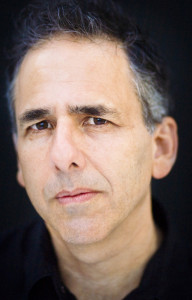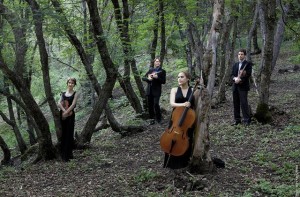In continuing a bold season of genius choices for programming, Nova Chamber Music Series sets the right stakes in its upcoming ‘Late Beethoven and Post-Minimalism’ concert featuring the Fry String Quartet and six Utah percussionists.
 Jason Hardink, Nova’s artistic director, has selected two precedent-breaking works – one composed in 1824 and the other in 2009 – that are remarkable for precisely the same reason. Whether in Beethoven’s sonorous, angelic string quartet or Michael Gordon’s stunning, mesmerizing soundscape, the music’s wealth of small notes and brilliantly compacted musical ideas and motifs in both instances organically leads listeners to appreciate the boldness of the composer’s artistic exploration.
Jason Hardink, Nova’s artistic director, has selected two precedent-breaking works – one composed in 1824 and the other in 2009 – that are remarkable for precisely the same reason. Whether in Beethoven’s sonorous, angelic string quartet or Michael Gordon’s stunning, mesmerizing soundscape, the music’s wealth of small notes and brilliantly compacted musical ideas and motifs in both instances organically leads listeners to appreciate the boldness of the composer’s artistic exploration.
The concert will take place Tuesday, Feb. 3 at 7:30 p.m. in the Libby Gardner Hall at The University of Utah.
‘Timber,’ Gordon’s work for six percussionists who use graduated, amplified, wooden simantras (2x4s) in the performance, has thrilled audiences around the world ever since its 2011 premiere at The Hague. Commissioned by Slagwerk Den Haag and Mantra Percussion, the work was cited as one of the ten most memorable musical performances of 2012 by Alex Ross at The New Yorker. This spring, ‘Timber’ is being performed in numerous venues including Amsterdam, Vancouver, Berlin, Brooklyn, Zagreb and locations in Ireland and Holland.

‘Timber’ leads to a deeper breadth in understanding what post-minimalism means in music, a concept that often is misapplied and misunderstood not just by listeners in concert halls but even by some musicians and certainly critics.
Gordon’s work goes more directly to a conceptualization of post-minimalism put forth by composer and critic Kyle Gann, who sees genuine post-minimalist music as laying out the environment for the type of meditative state that is a new idea for many Westerners. Gann writes, “Even when post-minimalist music is partly dissonant, harsh, or rhythmically complex, it has a sustained, continuous character that gives an impression of overarching calm. Dissonances and conflicts appear, but virtually never disrupt the musical surface. The first art-music style to arise from a collective perception of relativity, in total freedom from social mandates, post-minimalism used its freedom ethically, to paint visions of a calm, less aggressive, and more sustainable future.”
There certainly are hints of this ideal in Beethoven’s String Quartet in E Flat Major, Op. 127, which was composed in 1824 and is the first of the series of the composer’s late quartets which are collectively celebrated as among the finest music ever composed for chamber ensemble.
Although the work was composed in a traditional classical form of four movements and is yet another example of how Beethoven set forth the Romantic Era in music, this quartet – written by Beethoven late in his life (he would be dead within three years) – serves up many surprises to the listener.

The late Dr. Robert Simpson, one of the greatest music personalities ever to be associated with The British Broadcasting Corporation (BBC) wrote, “The astonishing beauty and innocence of much of the music seems to clothe a spirit more bold and exploratory than ever before.” Simpson marveled at Beethoven’s capacity for deceptive simplicity: “The unobtrusive originality of everything in this great work is typified by the main theme of the finale; it begins with two regular eight-bar phrases that sound tantalisingly irregular – as if they were 3+5+3+5. The simplest things seem continually to renew themselves.”
Once again, Hardink also has assembled more of Utah’s deep bench of superiorly talented musicians for this program. The Fry String Quartet, founded in 1997 in Chicago, is now in a long-term residency at Utah State University’s Caine College of Arts. The group performed the entire cycle of Beethoven’s string quartet over a six-week period which brought sold-out audiences to the concerts on the USU campus.
Members of the quartet are Robert Waters and Rebecca McFaul on violin, Bradley Ottesen on viola and Anne Francis Bayless on cello.
Gordon’s masterpiece features Percussion Utah comprising six of the most active and widely sought percussionists in the area. Performers are Keith Carrick, Eric Hopkins, Jason Nicholson, Michael Pape, Michael Sammons and Gavin Ryan.
Tickets are available here.

